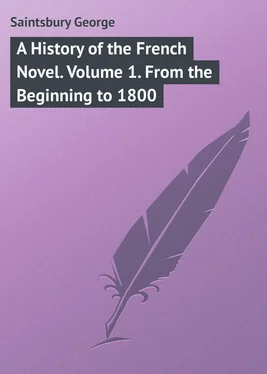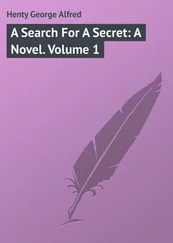George Saintsbury - A History of the French Novel. Volume 1. From the Beginning to 1800
Здесь есть возможность читать онлайн «George Saintsbury - A History of the French Novel. Volume 1. From the Beginning to 1800» — ознакомительный отрывок электронной книги совершенно бесплатно, а после прочтения отрывка купить полную версию. В некоторых случаях можно слушать аудио, скачать через торрент в формате fb2 и присутствует краткое содержание. Жанр: foreign_language, foreign_prose, на английском языке. Описание произведения, (предисловие) а так же отзывы посетителей доступны на портале библиотеки ЛибКат.
- Название:A History of the French Novel. Volume 1. From the Beginning to 1800
- Автор:
- Жанр:
- Год:неизвестен
- ISBN:нет данных
- Рейтинг книги:4 / 5. Голосов: 1
-
Избранное:Добавить в избранное
- Отзывы:
-
Ваша оценка:
- 80
- 1
- 2
- 3
- 4
- 5
A History of the French Novel. Volume 1. From the Beginning to 1800: краткое содержание, описание и аннотация
Предлагаем к чтению аннотацию, описание, краткое содержание или предисловие (зависит от того, что написал сам автор книги «A History of the French Novel. Volume 1. From the Beginning to 1800»). Если вы не нашли необходимую информацию о книге — напишите в комментариях, мы постараемся отыскать её.
A History of the French Novel. Volume 1. From the Beginning to 1800 — читать онлайн ознакомительный отрывок
Ниже представлен текст книги, разбитый по страницам. Система сохранения места последней прочитанной страницы, позволяет с удобством читать онлайн бесплатно книгу «A History of the French Novel. Volume 1. From the Beginning to 1800», без необходимости каждый раз заново искать на чём Вы остановились. Поставьте закладку, и сможете в любой момент перейти на страницу, на которой закончили чтение.
Интервал:
Закладка:
The poetaster and literary hack, Whetstone, who wrote a poetical memoir of George Gascoigne after his death, entitles it a remembrance of "the well employed life and godly end" of his hero. It is not necessary to dispute that Gascoigne's end was godly; but except for the fact that he was for some years a diligent and not unmeritorious writer, it is not so certain that his life was well employed. At any rate he does not seem to have thought so himself. The date of his birth has been put as early as 1525 and as late as 1536: he certainly died in 1577. His father, a knight of good family and estate in Essex, disinherited him; but he was educated at Cambridge, if not at both universities, was twice elected to Parliament, travelled and fought abroad, and took part in the famous festival at Kenilworth. His work is, as has been said, considerable, and is remarkable for the number of first attempts in English which it contains. It has at least been claimed for him (though careful students of literary history know that these attributions are always rather hazardous) that he wrote the first English prose comedy ( The Supposes , a version of Ariosto), the first regular verse satire ( The Steel Glass ), the first prose tale (a version from Bandello), the first translation from Greek tragedy ( Jocasta ), and the first critical essay (the above-mentioned Notes of Instruction ). Most of these things, it will be seen, were merely adaptations of foreign originals; but they certainly make up a remarkable budget for one man. In addition to them, and to a good number of shorter and miscellaneous poems, must be mentioned the Glass of Government (a kind of morality or serious comedy, moulded, it would seem, on German originals), and the rather prettily, if fantastically termed Flowers, Herbs, and Weeds . Gascoigne has a very fair command of metre: he is not a great sinner in the childish alliteration which, surviving from the older English poetry, helps to convert so much of his contemporaries' work into doggerel. The pretty "Lullaby of a Lover," and "Gascoigne's Good Morrow" may be mentioned, and part of one of them may be quoted, as a fair specimen of his work, which is always tolerable if never first-rate.
"Sing lullaby, as women do,
Wherewith they bring their babes to rest,
And lullaby can I sing too,
As womanly as can the best.
With lullaby they still the child;
And if I be not much beguiled,
Full many wanton babes have I
Which must be stilled with lullaby.
"First lullaby, my youthful years.
It is now time to go to bed,
For crooked age and hoary hairs
Have won the hav'n within my head:
With lullaby then, youth, be still,
With lullaby content thy will,
Since courage quails and comes behind,
Go sleep and so beguile thy mind.
"Next lullaby, my gazing eyes,
Which wanton were to glance apace,
For every glass may now suffice
To show the furrows in my face.
With lullaby then wink awhile,
With lullaby your looks beguile;
Let no fair face, nor beauty bright,
Entice you oft with vain delight.
"And lullaby, my wanton will,
Let reason(s) rule now rein thy thought,
Since all too late I find by skill
How dear I have thy fancies bought:
With lullaby now take thine ease,
With lullaby thy doubts appease,
For trust to this, if thou be still
My body shall obey thy will."
Thomas Churchyard was an inferior sort of Gascoigne, who led a much longer if less eventful life. He was about the Court for the greater part of the century, and had a habit of calling his little books, which were numerous, and written both in verse and prose, by alliterative titles playing on his own name, such as Churchyard's Chips , Churchyard's Choice , and so forth. He was a person of no great literary power, and chiefly noteworthy because of his long life after contributing to Tottel's Miscellany , which makes him a link between the old literature and the new.
The literary interests and tentative character of the time, together with its absence of original genius, and the constant symptoms of not having "found its way," are also very noteworthy in George Turberville and Barnabe Googe, who were friends and verse writers of not dissimilar character. Turberville, of whom not much is known, was a Dorsetshire man of good family, and was educated at Winchester and Oxford. His birth and death dates are both extremely uncertain. Besides a book on Falconry and numerous translations (to which, like all the men of his school and day, he was much addicted), he wrote a good many occasional poems, trying even blank verse. Barnabe Googe, a Lincolnshire man, and a member of both universities, appears to have been born in 1540, was employed in Ireland, and died in 1594. He was kin to the Cecils, and Mr. Arber has recovered some rather interesting details about his love affairs, in which he was assisted by Lord Burghley. He, too, was an indefatigable translator, and wrote some original poems. Both poets affected the combination of Alexandrine and fourteener (split up or not, as the printer chose, into six, six, eight, six), the popularity of which has been noted, and both succumbed too often to its capacities of doggerel. Turberville's best work is the following song in a pretty metre well kept up: —
"The green that you did wish me wear
Aye for your love,
And on my helm a branch to bear
Not to remove,
Was ever you to have in mind
Whom Cupid hath my feire assigned.
"As I in this have done your will
And mind to do,
So I request you to fulfil
My fancy too;
A green and loving heart to have,
And this is all that I do crave.
"For if your flowering heart should change
His colour green,
Or you at length a lady strange
Of me be seen,
Then will my branch against his use
His colour change for your refuse. 8 8 Refusal.
"As winter's force cannot deface
This branch his hue,
So let no change of love disgrace
Your friendship true;
You were mine own, and so be still,
So shall we live and love our fill.
"Then I may think myself to be
Well recompensed,
For wearing of the tree that is
So well defensed
Against all weather that doth fall
When wayward winter spits his gall.
"And when we meet, to try me true,
Look on my head,
And I will crave an oath of you
Whe'r 9 9 Short for "whether."
Faith be fled;
So shall we both answered be,
Both I of you, and you of me."
The most considerable and the most interesting part of Googe's work is a set of eight eclogues which may not have been without influence on The Shepherd's Calendar , and a poem of some length entitled Cupido Conquered , which Spenser may also have seen. Googe has more sustained power than Turberville, but is much inferior to him in command of metre and in lyrical swing. In him, or at least in his printer, the mania for cutting up long verses reaches its height, and his very decasyllables are found arranged in the strange fashion of four and six as thus: —
"Good aged Bale:
That with thy hoary hairs
Dost still persist
To turn the painful book,
O happy man,
That hast obtained such years,
And leav'st not yet
On papers pale to look.
Give over now
To beat thy wearied brain,
And rest thy pen,
That long hath laboured sore."
Thomas Tusser (1524? -1580) has often been regarded as merely a writer of doggerel, which is assuredly not lacking in his Hundred (later Five Hundred ) Points of Husbandry (1557-1573). But he has some piquancy of phrase, and is particularly noticeable for the variety, and to a certain extent the accomplishment, of his prosodic experiments – a point of much importance for the time.
Читать дальшеИнтервал:
Закладка:
Похожие книги на «A History of the French Novel. Volume 1. From the Beginning to 1800»
Представляем Вашему вниманию похожие книги на «A History of the French Novel. Volume 1. From the Beginning to 1800» списком для выбора. Мы отобрали схожую по названию и смыслу литературу в надежде предоставить читателям больше вариантов отыскать новые, интересные, ещё непрочитанные произведения.
Обсуждение, отзывы о книге «A History of the French Novel. Volume 1. From the Beginning to 1800» и просто собственные мнения читателей. Оставьте ваши комментарии, напишите, что Вы думаете о произведении, его смысле или главных героях. Укажите что конкретно понравилось, а что нет, и почему Вы так считаете.












